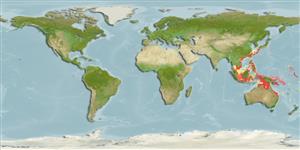Teleostei (teleosts) >
Callionymiformes (Dragonets) >
Callionymidae (Dragonets)
Etymology: Callionymus: Greek, kallion, comparative of kallos = beautiful + Greek, onyma = name; with a better name.
Environment: milieu / climate zone / depth range / distribution range
Ecology
Marine; demersal; depth range ? - 70 m (Ref. 58018). Tropical
Western Pacific: Indonesia (Ref. 5978), Vietnam and Taiwan (Ref. 87929).
Size / Weight / Age
Maturity: Lm ? range ? - ? cm
Max length : 10.8 cm SL male/unsexed; (Ref. 5978)
Dorsal spines (total): 4; Dorsal soft rays (total): 9; Anal soft rays: 9. Head and body light brown, back with many light spots, ventral parts yellowish to white. Sides with a row of dark blotches. Pectoral-fin base with a dusky spot. First dorsal fin in males whitish, in females black. Second dorsal, caudal, pectoral, and pelvic fins spotted with brown. Anal fin black in males, with a distal black streak in females (Ref 42832).
Life cycle and mating behavior
Maturity | Reproduction | Spawning | Eggs | Fecundity | Larvae
Gloerfelt-Tarp, T. and P.J. Kailola, 1984. Trawled fishes of southern Indonesia and northwestern Australia. Australian Development Assistance Bureau, Australia, Directorate General of Fishes, Indonesia, and German Agency for Technical Cooperation, Federal Republic of Germany. 407 p. (Ref. 5978)
IUCN Red List Status (Ref. 130435: Version 2024-1)
Threat to humans
Harmless
Human uses
Tools
Special reports
Download XML
Internet sources
Estimates based on models
Preferred temperature (Ref.
123201): 25.1 - 29, mean 28 °C (based on 330 cells).
Phylogenetic diversity index (Ref.
82804): PD
50 = 0.5000 [Uniqueness, from 0.5 = low to 2.0 = high].
Bayesian length-weight: a=0.00891 (0.00410 - 0.01937), b=2.78 (2.60 - 2.96), in cm total length, based on LWR estimates for this Genus-body shape (Ref.
93245).
Trophic level (Ref.
69278): 3.3 ±0.4 se; based on size and trophs of closest relatives
Resilience (Ref.
120179): High, minimum population doubling time less than 15 months (Preliminary K or Fecundity.).
Fishing Vulnerability (Ref.
59153): Low vulnerability (10 of 100).
